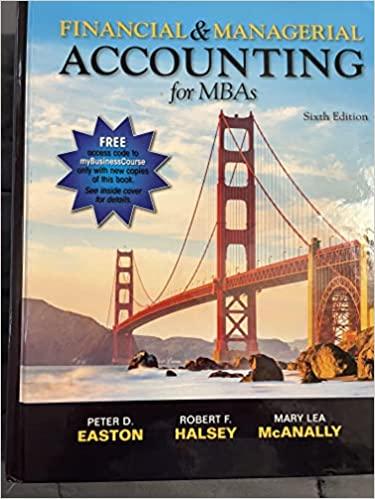Question
Assume you have just been hired as a business manager of Pizza Palace, a pizza restaurant located adjacent to campus. The company's EBIT was$500,000 last
Assume you have just been hired as a business manager of Pizza Palace, a pizza restaurant located adjacent to campus. The company's EBIT was$500,000 last year, and since the university's enrollment is capped, EBIT is expected to remain constant (in real terms) over time. Since no expansion capital will be required, Pizza Palace plans to pay out all earnings as dividends. The management group owns about 50 percent of the stock and the stock is traded in the over-the-counter market. The firm is currently financed with all equity; it has 100,000 shares outstanding; and Po=$25 per share. When you took your MBA corporate finance course, your instructor stated that most firm's owners would be financially better off if the firms used some debt. When you suggested this to your new boss, he encouraged you to pursue the idea. As a first step, assume that you obtained from the firm's investment banker the following estimated costs of debt for the firm at different debt levels (in thousands of dollars)
If the company were to recapitalize, debt would be issued, and the funds received would be used to repurchase stock. Pizza Palace is in the 40% state-plus-federal tax bracket, the risk-free rate is6 percent, and the market risk premium is 6 percent.
- Provide a brief overview of capital structure effects. Be sure to identify the ways in which capital structure can affect the weighted average cost of capital and free cashflows.
- What is business risk? What factors influence a firm's business risk?
- What is operating leverage, and how does it affect a firm's business risk?
- Show the operating break-even point if a company has fixed costs of $200, a sales price of $15, and variables costs of $10.
- Now, to develop an example that can be presented to Pizza Palace's management to illustrate the effects of financial leverage, consider two hypothetical firms: Firm U, which uses no debt financing, and Firm L, which uses $10,000 of 12 percent debt. Both firms have $20,000 in assets, a 40 percent tax rate, and an expected EBIT of$3,000.
- Construct partial income statements, which start with EBIT, for the two firms.
- Now calculate ROE for both firms.
- What does this example illustrate about the impact of financial leverage on ROE?
- Explain the difference between financial risk and business risk.
- What does capital structure theory attempt to do? What lessons can be learned from capital structure theory? Be sure to address the MM model.
- What does the empirical evidence say about capital structure theory? What are the implications for managers?
Step by Step Solution
There are 3 Steps involved in it
Step: 1

Get Instant Access to Expert-Tailored Solutions
See step-by-step solutions with expert insights and AI powered tools for academic success
Step: 2

Step: 3

Ace Your Homework with AI
Get the answers you need in no time with our AI-driven, step-by-step assistance
Get Started


